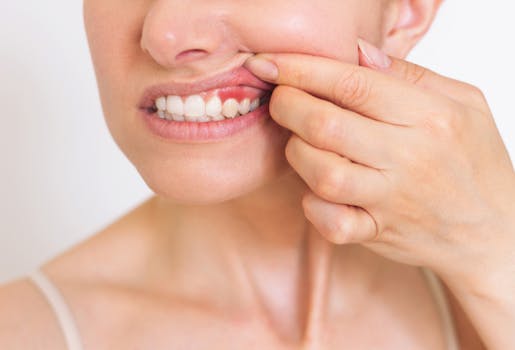Tooth Loss: Causes, Consequences and Prevention Options
Tooth loss is a problem that affects many people throughout their lives, and the reasons for it are varied. From caries and gum inflammations like gingivitis to serious conditions like periodontitis - the causes of missing teeth can be different. In this article, you will learn what the most common cause of tooth loss is, how you can prevent it, and what treatment options are available if it does happen.



The main causes of tooth loss
The most common reason for tooth loss is periodontitis. This is an advanced form of gum inflammation, which begins with seemingly harmless symptoms such as bleeding gums, redness and swelling. However, if left untreated, the inflammation attacks the supporting structure of the tooth, which consists of the gums, fibers, and the jawbone. The bacterial infection causes the destruction of the tissue anchoring the tooth in the jaw. As a result, the tooth loses its hold and, in the worst case, falls out. Once lost, the affected tooth cannot be easily replaced, and the process of tooth loss often accelerates.
Caries is another main cause of tooth loss. This disease occurs when bacteria form a film called plaque on the teeth. This attacks the enamel, resulting in holes in the tooth. If caries is left untreated, it will continue to penetrate deeper into the tooth, eventually affecting the tooth root. At this stage, the tooth is often beyond saving. It is particularly dangerous when caries reach the tooth nerve, as this often leads to severe pain and necessitates tooth extraction.
A often overlooked reason for tooth loss is teeth grinding. This habit, which usually occurs at night, leads to excessive pressure on the teeth. The constant grinding causes dental erosion and misalignment in the jaw joint, which can impair the stability of the teeth in the long term and even cause their loss.
Early signs of dental problems
There are numerous symptoms that indicate a potential risk to your dental health. You can easily recognise some of these warning signs yourself. If you notice the following initial signs, you should take immediate action to ensure the preservation of your teeth:
- Bleeding gums: Do you bleed when brushing your teeth or using floss? This could be a sign of an emerging gum disease.
- Redness and swelling: Inflamed gums often show noticeable changes such as swelling and intense redness.
- Gum pockets: In gum diseases, so-called gum pockets often form, where bacteria can easily multiply and exacerbate the bacterial infection.
- Dental plaque and tartar: An excessive build-up of plaque and stubborn tartar can lead to serious conditions if not removed in a timely manner through a professional dental cleaning.
If you observe any of these symptoms, you should not hesitate to visit our studio or a dental practitioner. Early diagnosis and treatment can significantly contribute to preventing tooth loss.


For a healthy mouth and beautiful teeth, regular professional teeth cleaning is essential. Our specialists detect early signs of caries and prevent them.
- Personalised dental hygiene
- Gum check & caries control
- Painless cleaning with AIRFLOW
Consequences of tooth loss
Missing teeth do not only affect your appearance. They also have profound impacts on dental health and the functionality of the bite. A tooth loss can lead to misload of the adjacent teeth, resulting in these teeth being overburdened and weakened. The jaw joints are also affected as balance in the mouth is disrupted, often leading to long-term consequences for the entire jaw apparatus.
Another problem associated with tooth loss is the loss of bone substance in the jaw. When the tooth is no longer anchored in the jawbone, this area of the jaw is no longer stimulated by chewing movements. This leads to the so-called bone resorption, which affects not only dental health but also your external appearance. Over time, a visible sinking of the facial profile may occur.
Dentures: What to do in case of tooth loss?
Fortunately, there are numerous ways available today to replace missing teeth. The most common forms of tooth replacement are:
- Dental implants: One of the best solutions for missing teeth are implants. These are anchored directly in the jawbone and provide stable support for the tooth replacement. They act like one's own teeth and prevent bone loss.
- Bridges: A bridge is attached to the adjacent teeth to close the gap. However, healthy teeth often need to be ground down for this, which can impair their stability in the long run.
- Dentures: In the case of loss of multiple teeth or total loss, dentures can provide relief. Modern dentures are often removable and can be attached to the existing teeth or the jawbone.
How to prevent tooth loss
The loss of teeth is an issue that affects many people, and the best treatment is to prevent it from occurring in the first place. Through consistent oral hygiene and regular dental check-ups, you can effectively prevent the most common cause of tooth loss, such as tooth decay and periodontitis. Here's what measures are crucial to prevent tooth loss and maintain your oral health in the long term.
Regular teeth brushing
Teeth brushing forms the foundation for healthy teeth. To effectively remove dental plaque, you should brush your teeth thoroughly at least twice a day. It is crucial to use a technique that is gentle on the enamel as well as reaches all areas of the mouth. Use a toothbrush with soft bristles to avoid irritating the gums, and use a fluoride toothpaste. Fluoride strengthens the enamel and protects against tooth decay. Use our Whitening Toothpastes for this purpose.
Cleaning of interdental spaces
Apart from teeth brushing, cleaning the interdental spaces is an essential part of daily dental care. Often food residues and plaque accumulate in these narrow areas, which are difficult to reach with a toothbrush. This is where floss and interdental brushes come into play.
Professional teeth cleaning
Even with thorough oral hygiene at home, stubborn deposits of tartar can build up over time, which can only be removed through a professional dental cleaning at the ALPINE WHITE Studio or in the dental practice. Therefore, it is advisable to have such a cleaning done at least once a year.
Healthy Nutrition
In addition to daily dental care, a balanced diet also plays a crucial role in oral health. Sugary foods, like sweets or soft drinks, are a well-known risk factor for tooth decay. Sugar promotes the growth of bacteria that produce acids and attack the enamel. To prevent this, you should limit your sugar intake and instead focus on a diet rich in vitamins and minerals.
Particularly important are foods that contain calcium and vitamin D, as these strengthen the bone substance, providing not only the stability of your teeth but also maintaining the jawbone. Dairy products like cheese and yoghurt are ideal, as they neutralise the pH value in the mouth and protect the enamel.
Regular ALPINE WHITE Visits
Another indispensable measure to prevent tooth loss is regular oral health checks with us. These appointments are not only important to treat existing problems but also to identify and prevent future issues early on.
Studio visits also provide the opportunity to check the condition of the periodontium and the jawbone. Early diagnosis of problems such as periodontitis or bruxism can help avoid serious consequences such as tooth loss. Your dental hygienist can also advise you on specialised dental care techniques that are best suited to your situation.
Tooth Loss in Milk Teeth
Proper care of milk teeth is also crucial in children to avoid later tooth problems. Milk teeth serve as placeholders for permanent teeth and help maintain the jaw in the correct position. If milk teeth are lost prematurely due to tooth decay or other problems, it can lead to misalignments of the permanent teeth. Make sure that your child's milk teeth are also carefully maintained to prevent later complications.


Not sure about the health of your mouth? Thanks to our innovative intra-oral camera, we can give you a detailed overview and offer you the best possible individual routine.
- We check your oral health and hygiene
- Checking your teeth for cavities
- Composition of an individual routine
Conclusion
Tooth loss is a serious problem that can result from a variety of causes such as cavities, gum disease, or teeth grinding. The best prevention is good oral hygiene and regular visits to the dentist. If tooth loss does occur, dental implants and other forms of tooth replacement offer a long-term solution. By paying attention to the early signs such as bleeding gums, redness, or swelling, you can do a lot to preserve your own teeth.
Your dental health is in your hands – with the right care and prevention, you can avoid gaps in your teeth and the consequences of tooth loss!


